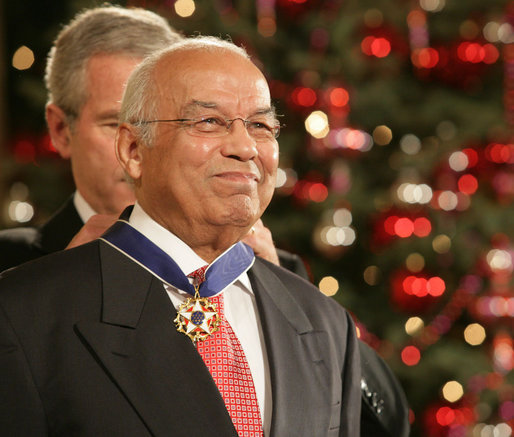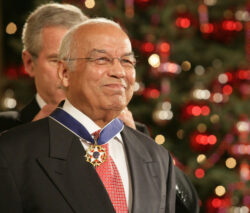Norman C. Francis
Educator and civil rights leader Norman C. Francis served as president of Xavier University of Louisiana for forty-seven years.

White House
Dr. Norman Francis is honored by President George W. Bush with the Presidential Medal of Freedom on December 15, 2006. Photo by Shealah Craighead.
Norman Christopher Francis is a distinguished higher education leader and civil rights advocate. He served as president of Xavier University of Louisiana for forty-seven years, from 1968 to 2015, making him the longest-serving university president in the United States at his retirement. He was the first Black and lay president of an American Catholic university. Under his leadership Xavier became a top producer of Black students earning undergraduate degrees in the health and sciences professions and in sending Black students to school to complete their medical degrees. In the aftermath of Hurricane Katrina, Gov. Kathleen Blanco appointed Francis to lead the Louisiana Recovery Authority, demonstrating the state’s faith in his exceptional commitment to his community and its overall advancement.
Early Life
Francis was born to Joseph and Mabel Francis in Lafayette on March 20, 1931. Growing up in a segregated South, he faced numerous challenges but remained steadfast in his pursuit of education and equity. Francis graduated from St. Paul High School as its valedictorian and earned his undergraduate degree from Xavier in 1952. He received his law degree from Loyola University in New Orleans in 1955, becoming one of two Black law students (the other being Benjamin Johnson, also a Xavier alumnus) to graduate from the formerly segregated institution.
Francis married Blanche Macdonald in 1955, with whom he had six children: Michael, Timothy, David, Patrick, Kathleen, and Christina. The values of faith, education, and service that shaped his family life also influenced his professional pursuits.
Civil Rights Activity
In 1957 the Louis A. Martinet Legal Society was founded, so named in honor of the prominent Black lawyer involved in civil rights during the Reconstruction era. The establishment of the society to support and advocate for Black legal professionals furthered the cause of civil rights and justice. Francis joined this collective effort with Israel Augustine, Lionel Collins, Robert Collins, Nils Douglas, Vanue LaCour, Revius Ortique Jr., and A. P. Tureaud, among others.
Francis began as dean of men at Xavier in 1957. In 1961, during the civil rights movement, he generated controversy by providing housing at Xavier for the Freedom Riders, who were part of the Congress of Racial Equality (CORE)’s nonviolent action to integrate interstate buses and challenge segregation in the South. Housing the Freedom Riders at Xavier was a bold and unprecedented move for the time, as most administrators at Historically Black Colleges and Universities were cautious about openly supporting civil rights activists, fearing backlash from segregationists and potential funding losses.
Francis, always a sports enthusiast, and Constant Dejoie Sr. shared part ownership in the New Orleans Saints National Football League team by 1967. Ownership in the Saints symbolized a significant milestone in Black progress, as it represented not only the increasing visibility of Black Americans in leadership roles within professional sports but also a step forward in social progress and economic empowerment. Francis’s and Dejoie Sr.’s involvement opened doors for Black participation in sports ownership, creating new opportunities for wealth accumulation in an area that previously barred Black people.
In 1972 Francis co-founded Liberty Bank and Trust Company to provide financial services to underserved Black communities. With the distinction of being the sole president of the board since its inception, he has played a pivotal role in directing the bank’s development. Over time Liberty Bank has established itself as one of the leading Black-owned banks in the United States, operating branches in various states. The bank’s mission is to play a vital role in Black banking by promoting economic stability, fostering growth, and providing credit and financial services to individuals and businesses.
Francis’s close relationships with political figures such as former New Orleans Mayor Maurice “Moon” Landrieu and Ernest “Dutch” Morial, the city’s first Black mayor, were instrumental in advancing civil rights and improving the lives of the citizens of New Orleans. For example, Francis worked closely with Landrieu in the 1970s to desegregate public facilities and increase Black employment in city government. Similarly his partnership with Morial helped establish affirmative action programs and promote minority-owned businesses, fostering economic growth and social equity in the city.
Role as Educator
In addition to serving as dean of men beginning in 1957, Francis served in multiple roles at Xavier, including as director of student personnel services beginning in 1963; assistant to the president for student affairs in 1964; assistant to the president in charge of development in 1965; and executive vice president in 1967. In 1968 he was inaugurated as the university’s fifth president. He retired as president in 2015.
Francis’s career contributions have received numerous accolades and recognitions. He has served on a range of national directives. He was a National Commission on Excellence in Education task force member. The group released the landmark 1983 report, “A Nation at Risk,” which highlighted challenges in the American education system and called for comprehensive reforms to ensure the future competitiveness and success of the country’s students. A prominent figure in the educational community, Francis served as the chair of the board of the Educational Testing Service, the Southern Association of Colleges and Schools Commission on Colleges, and the United Negro College Fund. His contributions to education and civil rights earned him numerous tributes, such as the Presidential Medal of Freedom, the nation’s highest civilian honor, by President George W. Bush in 2006.
Francis has held significant leadership roles within Catholic organizations, reflecting his deep commitment to his faith. He participated in Pope John Paul II’s historic visit to New Orleans in 1987 and the 2000 canonization celebration of Xavier’s founder, Katharine Drexel. Francis received the University of Notre Dame’s 2019 Laetare Medal during the institution’s commencement ceremony. The award is among the nation’s highest honors for Catholics.
Legacy
As a testament to Francis’s lasting legacy, in 2020, New Orleans renamed Jefferson Davis Parkway as Norman C. Francis Parkway. Jefferson Davis served as the president of the Confederate States during the American Civil War and represented the Confederacy’s support for slavery. The renaming process was a deliberate undertaking led by community leaders, activists, and city officials who aimed to commemorate Francis’s influential work in civil rights, education, and national, state, and local service. This change represents a broader shift toward recognizing and celebrating individuals who have contributed to progress and equality rather than those associated with divisions and exploitation. Renaming the parkway honors Francis’s lifetime of accomplishments and fosters a more inclusive and equitable historical narrative for Louisiana and the nation. Despite achieving great professional and personal acclaim, earning numerous honorary degrees, and solving problems large and small, Francis, affectionately known as “Doc,” remained humble and retained his personal integrity, treating everyone he met as a friend and peer.
